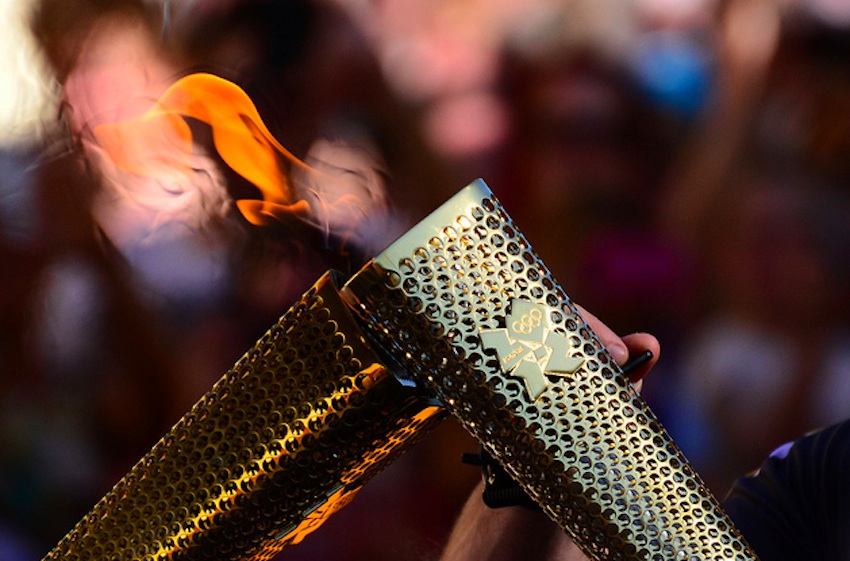The Future of the Boston Olympics Heads to Beacon Hill

Photo via mnewrc on Flickr
As Boston comes to terms with the tragedy that disrupted the city’s premiere sporting event, a committee on Beacon Hill will begin to assess the feasibility of bringing another major event to the area in 2024. On May 7, the legislature’s joint committee on Tourism, Arts and Cultural Development will convene to discuss forming a special commission to study the possibility of “hosting the summer Olympics in Boston and surrounding areas.”
In August 2012, an independent group of supporters launched a Twitter and Facebook campaign, followed by an official website, to rally support, and put the idea of Boston becoming the preeminent destination for the summer games on the table. The group, called the Boston Olympic Exploratory Committee, said its goal to get the Olympics to New England was “ambitious, but not impossible.”
“What began as two strangers meeting over a shared dream has grown to a group of 40-strong, dedicated to realizing the Olympic Movement in New England. In the months ahead, the Boston 2024 Exploratory Committee will evaluate the viability of hosting the games. There’s much work to be done if we are to succeed, but we’re up for the challenge and beyond excited to get started,” according to a statement from the group’s members.
While the idea was met with some criticism early on from Mayor Tom Menino, who called it “far-fetched,” in January, Sen. Eileen Donoghue, D-Lowell, filed a bill to put together a commission to study whether or not Boston could be host to the 2024 Olympics. According to the bill, filed on behalf of the Boston Olympic Exploratory Committee, a nine-member commission would be created to analyze all aspects of the Olympic Games from infrastructure, transportation, and lodging possibilities to locations, costs, and other factors.
“There are many positive aspects to consider about hosting the Olympics, including meaningful and long-term investment in infrastructure, potential revenue, old-fashioned civic pride, and the increased international profile and facilities that will keep people coming to visit our beautiful state long after the Olympics have gone,” Donoghue said in a statement on Monday. “We are still early in the process, but I look forward to fully exploring this idea.”
If formed, the commission would look at “the prospects of working with other New England states” and seek input from local government and organizations. The commission would have to complete its findings and submit recommendations to the appropriate offices by January 2014, giving them just eight months to sort out the necessary details.
But Boston may not even be on the minds of those responsible for casting bids for U.S. cities. According to a recent report from the Associated Press, Scott Blackmun, CEO of the United States Olympic Committee, which is tasked with submitting bids on behalf of the country in order to host the games, the group is looking at 10 cities at this time, but would not say if Boston was on that list. “We don’t want to submit a bid we don’t think we can win. We have to assess our chances. We want this bid to be a national bid, an American bid, not just a city bid. We want to make sure we have been as inclusive as possible,” Blackmun said.
Regardless, the public hearing on May 7 will go on as planned. The discussion will feature several speakers, including Boston Olympics Exploratory Committee cofounders Corey Dinopolous and Eric Reddy, Olympic medal winner Elliot Hovey, members of the Boston Organizing Committee, a group which studied the prospect of the Boston Olympics in the 1990s, and Boston City Councilor Matt O’Malley.
O’Malley says he has spoken to many people about the idea, and while there has been some concern about the potential impacts the Olympics could have on Boston from a financial standpoint, he fully supports having the discussion about forming an exploratory committee. “I’m very supportive of doing the feasibility study to see if bringing the Olympics to Boston makes sense. On its face, we have tremendous infrastructure and space, and ability to host the games better than many, many cities,” he says. “We want to make sure we do all of our due diligence, talk to the experts, and ensure all of our I’s are dotted and T’s are crossed before we get to applying, though. We have never hosted the modern Olympic games, so we want to make sure we do our homework.”
While the focus seems to be to bring the Summer Olympics to the city, a separate group has been hammering away trying to get the attention of those in charge in order to have the 2026 Winter Olympics in Boston as well. But members of the group behind that bid (and the website BostonWinterOlympics.com) says that, either way, they support the games coming to the city. “While we believe that the winter games are a better fit, we’re glad to see others working toward bringing the games to our world-class city,” the group said in a statement.


